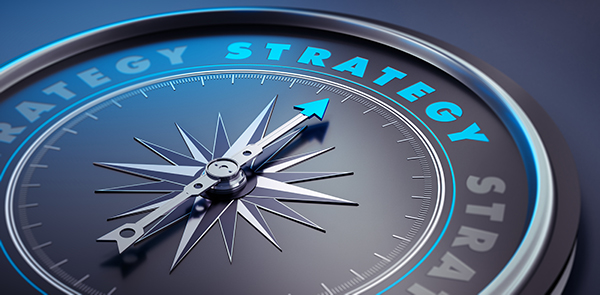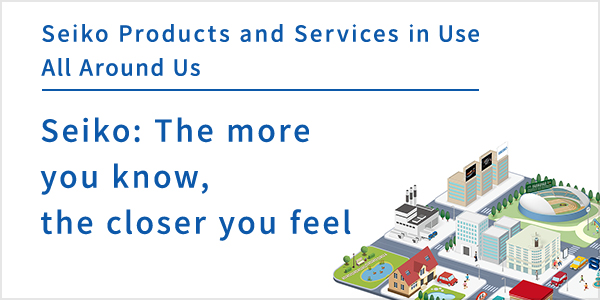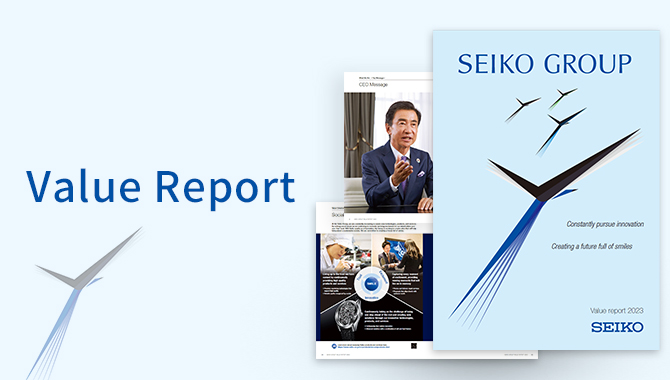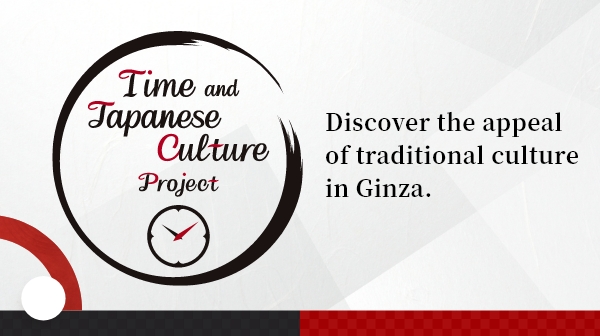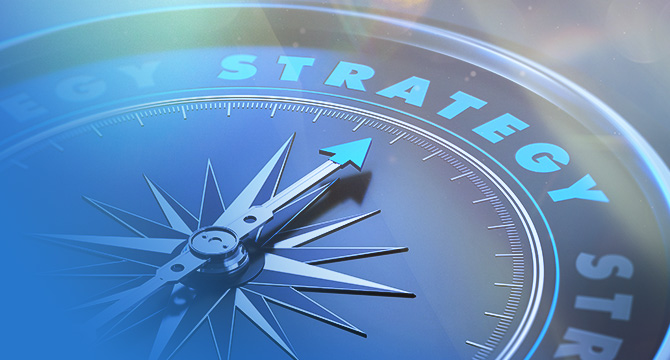
Seiko Group Corporation
Chairman, Group CEO, and Group CCO
Shinji Hattori
In the 19th century, when Japanese society made a radical change in how it measures time, the young founder of our group, Kintaro Hattori, took up the challenge of providing people with an accurate time reference (on the new, Western model) through the development of his watch and clock business. During the Great Kanto Earthquake of 1923, over 1,000 timepieces that customers had entrusted to his firm were lost in the ensuing fire. Kintaro chose to stand by his customers, replacing the lost items with equivalent new products at no charge. He also began re-hiring employees who had been laid off due to the factory fire as quickly as possible. Through these and many other challenges, our company has always prioritized responding to the needs of our stakeholders and working together to address important social issues.
Our implementation of initiatives to reduce CO₂ emissions, such as energy conservation, installation of solar panels, and the introduction of renewable energy, along with efforts aimed at human rights due diligence and strengthening corporate governance, demonstrate our sincere commitment to ESG (Environment, Social, Governance) ideals. These steps not only contribute to addressing pressing social issues, but are also essential for realizing a sustainable society. Needless to say, collaboration with our stakeholders is essential to achieve these goals.
Always keeping in mind our Group Purpose, which is grounded in our founder's vision, and the importance of building Trust with society (another theme that goes back to our founding), the Seiko Group is committed to responding to social issues through our sustainability policy. Our dedication to continuous growth, coupled with our aims to contribute to the development of a sustainable society, are designed to honor our founder's ideals. Our entire organization strives to make a meaningful contribution to society.

Seiko Group Corporation
Director, President, and Group COO
Shuji Takahashi
Following the announcement in July 2023 that the world's average temperature had reached the highest in recorded history, United Nations Secretary-General Guterres warned that the era of global warming had come to an end and an era of “global boiling” had begun. In recent times, many companies, including our Group firms, have taken steps such as reducing greenhouse gas emissions and adopting renewable energy to slow the advance of climate change. However, there is a pressing need to take stronger actions to mitigate climate change going forward.
Our group has established long-term greenhouse gas emission reduction targets based on the SBT (Science-Based Targets) criteria. By fiscal year 2030, we aim for a 42% reduction in Scope 1+2 emissions and a 25% reduction in Scope 3 emissions compared to FY2022. Furthermore, we are committed to achieving net-zero emissions by FY2050. To achieve these goals, we are implementing energy-saving measures and actively adopting renewable energy through initiatives such as Power Purchase Agreements (PPA) and power switching. In fact, we are accelerating our previous renewable energy adoption plan, and now aim to achieve 100% renewable energy use in Japan by FY2024.
In recent years, there has been a rapid increase in corporate awareness of human rights issues. It has become essential for businesses to properly assess the human rights situation in their head offices, group companies, and supply chains. Consequently, in May 2022, our Group established a human rights policy and revised our procurement policy, creating new procurement guidelines in November of that year. Currently, we are promoting human rights due diligence by identifying significant human rights issues within our Group and taking proactive steps to address these problems. In particular, as part of our commitment to sustainable procurement, we are strengthening constructive engagement with our suppliers.
We are also actively investing in human capital, and aiming to enhance the well-being of all our employees, as we continue on our journey to become a solutions-oriented Group.
We recognize these initiatives towards improving ESG as our corporate responsibility, and we are also taking other steps to address a range of social issues. Our Group has identified 13 materialities (significant issues) to be addressed, including increased efforts towards climate change and human rights. We aim to accelerate our corporate growth by responding to and resolving these materialities, ultimately striving to contribute to the realization of a sustainable society.

